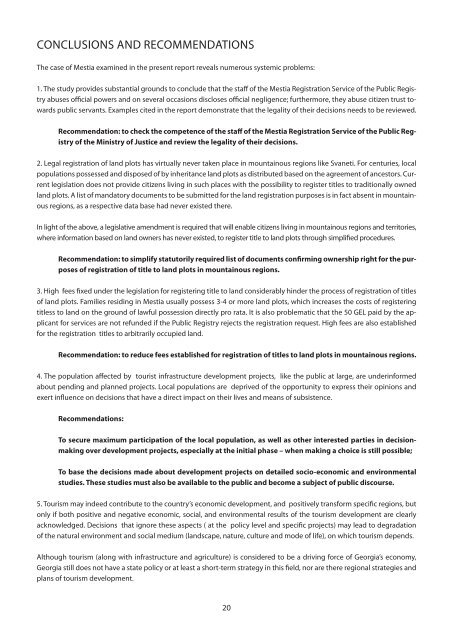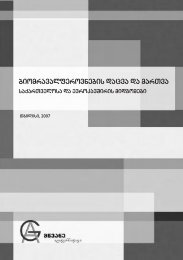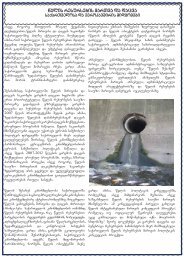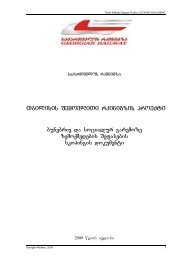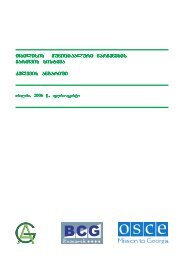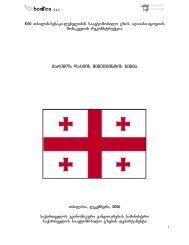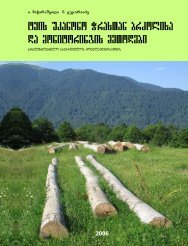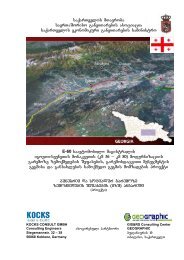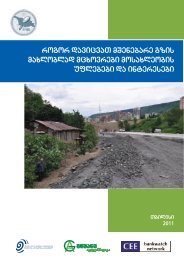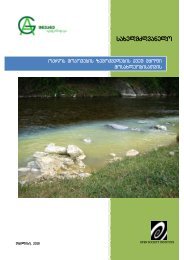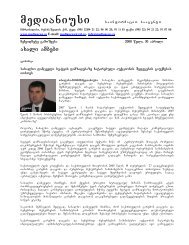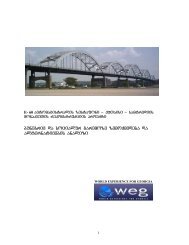The case of Mestia
The case of Mestia
The case of Mestia
- No tags were found...
Create successful ePaper yourself
Turn your PDF publications into a flip-book with our unique Google optimized e-Paper software.
CONCLUSIONS AND RECOMMENDATIONS<strong>The</strong> <strong>case</strong> <strong>of</strong> <strong>Mestia</strong> examined in the present report reveals numerous systemic problems:1. <strong>The</strong> study provides substantial grounds to conclude that the staf <strong>of</strong> the <strong>Mestia</strong> Registration Service <strong>of</strong> the Public Registryabuses oicial powers and on several occasions discloses oicial negligence; furthermore, they abuse citizen trust towardspublic servants. Examples cited in the report demonstrate that the legality <strong>of</strong> their decisions needs to be reviewed.Recommendation: to check the competence <strong>of</strong> the staf <strong>of</strong> the <strong>Mestia</strong> Registration Service <strong>of</strong> the Public Registry<strong>of</strong> the Ministry <strong>of</strong> Justice and review the legality <strong>of</strong> their decisions.2. Legal registration <strong>of</strong> land plots has virtually never taken place in mountainous regions like Svaneti. For centuries, localpopulations possessed and disposed <strong>of</strong> by inheritance land plots as distributed based on the agreement <strong>of</strong> ancestors. Currentlegislation does not provide citizens living in such places with the possibility to register titles to traditionally ownedland plots. A list <strong>of</strong> mandatory documents to be submitted for the land registration purposes is in fact absent in mountainousregions, as a respective data base had never existed there.In light <strong>of</strong> the above, a legislative amendment is required that will enable citizens living in mountainous regions and territories,where information based on land owners has never existed, to register title to land plots through simpliied procedures.Recommendation: to simplify statutorily required list <strong>of</strong> documents conirming ownership right for the purposes<strong>of</strong> registration <strong>of</strong> title to land plots in mountainous regions.3. High fees ixed under the legislation for registering title to land considerably hinder the process <strong>of</strong> registration <strong>of</strong> titles<strong>of</strong> land plots. Families residing in <strong>Mestia</strong> usually possess 3-4 or more land plots, which increases the costs <strong>of</strong> registeringtitless to land on the ground <strong>of</strong> lawful possession directly pro rata. It is also problematic that the 50 GEL paid by the applicantfor services are not refunded if the Public Registry rejects the registration request. High fees are also establishedfor the registration titles to arbitrarily occupied land.Recommendation: to reduce fees established for registration <strong>of</strong> titles to land plots in mountainous regions.4. <strong>The</strong> population afected by tourist infrastructure development projects, like the public at large, are underinformedabout pending and planned projects. Local populations are deprived <strong>of</strong> the opportunity to express their opinions andexert inluence on decisions that have a direct impact on their lives and means <strong>of</strong> subsistence.Recommendations:To secure maximum participation <strong>of</strong> the local population, as well as other interested parties in decisionmakingover development projects, especially at the initial phase – when making a choice is still possible;To base the decisions made about development projects on detailed socio-economic and environmentalstudies. <strong>The</strong>se studies must also be available to the public and become a subject <strong>of</strong> public discourse.5. Tourism may indeed contribute to the country’s economic development, and positively transform speciic regions, butonly if both positive and negative economic, social, and environmental results <strong>of</strong> the tourism development are clearlyacknowledged. Decisions that ignore these aspects ( at the policy level and speciic projects) may lead to degradation<strong>of</strong> the natural environment and social medium (landscape, nature, culture and mode <strong>of</strong> life), on which tourism depends.Although tourism (along with infrastructure and agriculture) is considered to be a driving force <strong>of</strong> Georgia’s economy,Georgia still does not have a state policy or at least a short-term strategy in this ield, nor are there regional strategies andplans <strong>of</strong> tourism development.20


